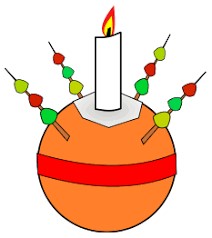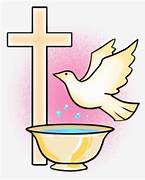Prayer: Less Looking Up and More Looking Around

Robin Meyers, minister, theologian, and author, concludes a chapter on prayer by recounting a story from the time his son was a 9-year-old. Reverend Robin was often distracted by concerns and thoughts connected to his work. So, his body might have been at the family picnic or school prize-giving, but his mind was drifting elsewhere. This is a common ministerial ailment (as those of you who grew up in manses know).
Robin recalls a night when only he and his young son were home. He switched off his phone and suggested making a fire in the backyard and cooking s’mores. (S’mores are one of those American creations: 2 crackers with a filling of toasted marshmallow and chocolate between). So together father and son sat under the stars, toasting and eating. The story ends with the son saying to him: “Dad, this was the greatest night of my life.”
If Robin was with us right now, the question I’d put to him would be: “What does this nice father-son story have to do with prayer?” And, having read his book, I guess Robin’s answer would be: “Prayer is about being present to that or who is right in front of you.”
Being present means listening and connecting in the now. Noticing what is before your eyes, what you are hearing, smelling (the fire), tasting (the s’mores), and feeling. It’s about – to use a Mary Oliver phrase – paying attention to all that is presently around you.
Or put in theological-speak, orthodoxy has long taught that Jesus was God incarnated in the world. After his death and resurrection, God continued to be incarnated through the work of the Holy Spirit. Which means God is not primarily located in some galaxy far, far away, but can be found and experienced here on Earth, in nature, activities, all manner of creatures, including in you and me. In short, there is nowhere where God is not.
Even in a Nazi concentration camp, or the hell of a Gaza, the Christian belief is that God is there – there in the bodies of the suffering and dying, there in the actions of those trying to help them, there in all who resist evil. As Cardinal Pizzaballa said this week, “Christ is not absent from Gaza, (but) there—crucified in the wounded, buried under rubble, and yet present in every act of mercy, every candle in the darkness, every hand extended to the suffering.”
God too, as eco-theology now reminds us, is not just on Earth but imbedded in earth, in rocks, trees, air, rivers, and oceans. God is through all and in all. God is not a supernatural visitor from space but the life energy in which, to quote St Paul, we live and move and have our being.
So, to return to Robin, his son, and the starry night, God was all around. In the between. In the feelings. In the presence. And Robin was paying attention. And his son was finding much joy.
To this experience Robin, or his son, at some future time, might want to follow Mary Oliver’s advice and try and patch some words together, not elaborate words, but words of thanksgiving for this experience. And, after holding those words, allow for silence into which ‘another voice’ may speak.
If Mary was with us right now, I would ask her about that ‘another voice’. What does it sound like? Is it a voice in the head? Or is it a breeze on the face? Or the chatter of that Tui outside? What is that voice saying? And I guess, and it’s an educated guess after reading a lot of her poetry, Mary’s answer would be: “Whatever is good, whatever gives life, whatever is beautiful, whatever is vulnerable… cherish, guard and propagate.”
So, a response to that ‘another voice’ might not be, probably will not be, speaking. As in creating a verbal dialogue. For cherishing, guarding, and propagating are feelings and actions, plannings and doings, dreamings and schemings, moving our bodies and joining with others. Prayer in this framing becomes a lot more than sitting still talking or meditating with God. It might be what looks like gardening, or singing, or cooking, or waving a placard in protest.
The problem with prayer is that many of us have grown up with a transactional understanding of the word. This is where we assume that God, as a supernatural being, has the power to give us what we need but can’t get without divine help. So, we ask. Even bargain. Like “I’ll be good.” And sometimes we receive Though frequently not. Despite what our scripture reading today says about persistence.
And although we may be critical of this transactional model, there are times, particularly times of crisis, when we cry out from our hearts for godly help, hoping that someone, something, anything, will come to the aid of those we love, to lessen suffering, theirs and now ours. And sometimes that which is good, life-giving, beautiful, and vulnerable does come to visit. Like a bird alighting on a window sill. Unexpected. Transitory. And at other times like a tranquil sea after a storm, calming and still, seemingly stretching forever.
Prayers of gratitude can be means of moving away from the transactional model and, rather than petitioning, are more like a song of astonishment and humility. Such thanking prayers can remind us of what we take for granted – a roof overhead, food on the table, the people in our lives. That’s why I like the prayer before a meal called ‘grace’, because the meal and all who partake are a gift/a grace/a blessing. Like this prayer:
For what we are about to receive,
the water we drink,
the air we breathe,
the feel of the sun,
the food of the earth,
this company, we people,
this now, this here,
may we be thankful,
may we be aware,
that every day is a gift,
and every breath a prayer.[i]
Rhyme gives rhythm. And prayer, like the heartbeat called God, is a rhythm. A rhythm of grace.
++++++++++++++++
Prayer is a big subject and this sermon, and the prayers of this service, are merely glimpses and thoughts tumbled together, which you may find helpful.
“As Jesus taught us, we pray”. So reads the liturgical preamble to what we know of as ‘The Lord’s Prayer’. But there are a few things to consider about this preamble. Firstly, Jesus’ whole life is a prayer. A movement of grace: healing, helping, listening, giving, suffering, and being present. Words said out loud, whether privately or publicly, is a very limited understanding of prayer. Maybe a better definition of prayer is ‘being present in God’. Or just ‘being present’. Like Robin was with his son.
Secondly, the preamble assumes Jesus taught it to his disciples. We don’t have any evidence of that. Not that it matters. The so-named ‘Lord’s Prayer’ has been around for a long time, and has a resonance with what we know of the historical Jesus’ theology and politics. Namely it is all about the commonwealth or reign of God, which Jesus taught is already here, and coming, being realized, bubbling up unexpectedly, serendipitously, to cherish, guard and propagate all that is good, life-giving, beautiful, and vulnerable.
And thirdly, lastly, we need to bear in mind that Jesus seemed to avoid public prayer. In Matthew 6 he counsels his followers to pray privately and not be heard by others. And he himself seems, eager even, to withdraw, avoid the demands and adulation of the crowds, to find some solitude and serenity walking over the Galilean hills.
Many of us in live under constant bombardment from words. From the moment we get out of bed, from diaries and messages, from reading emails and newspapers, from organizing and listening to others, our brain is busy, frequently flayed by information and insistence. The volumetrics of such noise can be tremendous. It is difficult then not to come despondent about prayer if it is just one more addition to the collection of sounds, one more clang in the cacophony, one more date in the litany of demands.
As for walking and prayer, Rabbi Abraham Heschel famously described his experience of marching in 1965 from Selma to Montgomery with Martin Luther King Jr. as “praying with his legs.” He felt that the act of walking, protesting, and standing in solidarity with others, particularly in the fight for civil rights, was a form of prayer.
Whilst taking nothing away from Heschel and his commitment, I think walking out your front door, maybe with a dog in tow, is also a prayer. If you allow yourself to be present. Present to the sights, smells, the sun or lack of, your body’s movements and breathing, and even the rhythm and presence of your canine companion. As Winnie-the-Pooh in his wisdom said, “Some people talk to animals. Not many listen though. That’s the problem.”
As to the Lord’s Prayer itself, Dom Crossan calls it ‘the strangest prayer’ to sayin a conservative Christian church. For it never mentions Christ, or church, or Sunday, or Lord, or inspired inerrancy of the Bible (virgin birth, atonement theology, miracles, bodily resurrection), or for that matter mission and evangelism, or even the Holy Spirit. Indeed, it is prayer that could be said by any member of a monotheist faith.
Crossan says the Lord’s Prayer is a revolutionary manifesto, a hymn of hope, depicting God as a householder who desires that everyone has enough and at peace with each other. That all human beings should have enough to survive and thrive, today and tomorrow, and excess be redistributed. That debts and failings be forgiven, so people can start again. That evil be resisted, so goodness can flourish. Indeed, it envisions all of Jesus ‘kingdom’ teaching – helping those in ditches, honouring Samaritans, welcoming prodigals, throwing banquets for the nuisances and nobodies.
But, Crossan goes on, weekly reciting of this prayer, indeed any prayer, doesn’t cut it. Read the prophets – like
Amos, Hosea, Isaiah, Micah, and Jeremiah. There, he says, you will learn it is not prayer and adulation that God demands. Rather, if justice is not being practiced then God wants none of the rest of it. Not prayer, not ritual, not liturgy, not praise. For the prophets, justice is what makes you faithful, and the rest of it is not only optional but, in the absence of justice, offensive. Again, quoting Rabbi Heschel, “Prayer is a mitzvah” (a good deed, a justice-propagating deed).
Gregory of Nyssa in the 380s, expounding on the Lord’s Prayer, links the simplicity of bread with the necessity of justice. (You are in prayer), he writes, “when your abundance does not come from what belongs to others; if your income is not derived from tears; if no one goes hungry because of your being full; if no one groans on account of your plenty.”[ii]
What Rabbi Heschel, Dom Crossan, and Bishop Gregory are talking about is maturing in prayer. In Crossan’s words, “from prayers of request, through prayers of gratitude, to prayers of empowerment.” The latter inviting us into collaboration with God, to pray with Jesus. Where we are the one who gets up, even if grumpily, in the middle of the night to offer the bread of friendship and solidarity to our persistent and needy neighbour. Where we are the ones who work with all manner of people, of many faiths or none, to cherish, guard and propagate all that is good, life-giving, beautiful, and vulnerable. Where we listen to the cries, the rhythms, the wonder of all life and seek to respond with practical help, necessary justice, and the grace of kindness.
So, in Robin Meyer’s words, less looking up and more looking around.
[i] Adapted from Martin Wroe.
[ii] On the Lord’s Prayer 4




